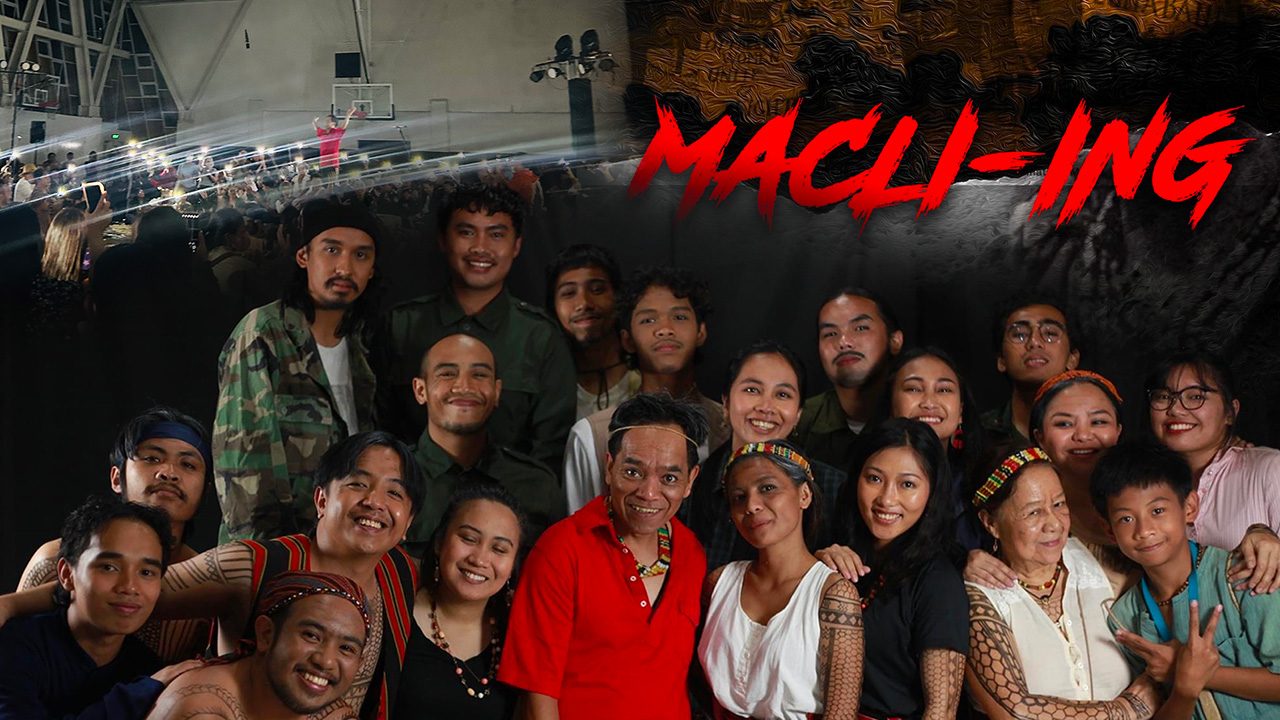SUMMARY
This is AI generated summarization, which may have errors. For context, always refer to the full article.

Macli-ing Dulag, the pangat or peace-pact holder of the Bugnay tribe in Tinglayan, Kalinga, was shot dead by government forces on April 24, 1980. He was one of the opposition leaders of the construction of Chico Dam, a pet project of then president Ferdinand Marcos, which would have flooded his village and those of the surrounding villages.
Macli-ing’s death made him a legend and sparked opposition against the Marcos regime.
The play Macli-ing was written by Malou Leviste Jacob and was staged by the Philippine Educational Theater Association (PETA) starting in 1988 with Soxy Topacio as director. Nanding Josef, who played Macli-ing, was among the PETA members who starred in the play, which was recognized as one of the most outstanding productions during the Marcos era.

Cordilleran activists started commemorating April 24 as Cordillera Day, as opposed to the Cordillera Day sanctioned by the government on July 15.
In 2019, a Chinese group began constructing and operating the Chico River Pump Irrigation System with the blessing of President Duterte.
And just when the legacy of Macli-ing Dulag was about to become flooded by the Chico River, Jacob’s Macli-ing was staged for the first time in the Cordillera with a mostly Cordilleran cast. Karlo Altomonte directed the two-day run of the play.
On the opening of its two-night run last December 3, the Himnasio Amianan in the University of the Philippines Baguio was packed with spectators. Tickets for the second night had already been sold out.

Among the audience was National Artist for Film, Kidlat Tahimik, whose enthusiastic response to the performance captured the essence of the evening.
“’Yung pinakamalakas para sa akin was ‘yung finale. ‘Yung finale, ‘di ba may mga Greek chorus sa Greek plays, tapos may mga Broadway chorus sa Broadway plays. Pero ‘yung paglabas ng mga gangsa, naku! Nakakatayo ng balahibo. I think that was the most original way of ending a play! Congratulations not only for the Cordillerans, pero para sa lahat ng nagmamahal sa bayan.”
(The strongest part for me was the finale. There are Greek choruses in Greek plays, and then there are Broadway choruses in Broadway plays. But when the gangsas were brought out, my gosh! It was hair-raising. I think that was the most original way of ending a play! Congratulations not only to the Cordillerans, but to all who love the country.)
Macli-ing unveiled
Playwright Malou Jacob, who now lives in Baguio, celebrated the production’s success.
“This is a beautiful performance. Tama ang sabi ni Kidlat, the ending is just right. But I must tell you that this is a play about Macli-ing and by Macli-ing. Everything that you have seen here came from him. What he said, what he did, I just put it together and structured it. But this is really Macli-ing.”
The family of Macli-ing were among those in the gym which was converted into a roundabout theater. Robert Macli-ing, son of Macli-ing, expressed his gratitude in Ilocano for the community theater’s invitation and praised the play’s quality.

His sister, Mannay Gunday, speaking in Ikalinga, delivered a poignant reminder of Macli-ing’s sacrifice for the Chico River. As a direct relative of Macli-ing, she made a heartfelt request to support Macli-ing’s grandchildren in their pursuit of education, acknowledging that many from her generation were denied this opportunity.
Unveiling opposing worldviews
Macli-ing unveils the clashing worldviews surrounding the hydroelectric power project along the Chico River in Kalinga and Bontoc. Eight years after the assassination of Macli-ing Dulag in Bugnay, Tinglayan, Kalinga, the villagers recount their life-and-death struggle against the World Bank-funded Chico Dam project.
Fueled by the enigmatic changya, a ritual plant that grew on Macli-ing’s tomb, the Man-aalisig, a spiritual leader, weaves a narrative of suffering, grief, resistance, and the relentless pursuit of justice, ancestral land rights, and self-determination.
Director Karlo Altomonte offered a glimpse into the journey of staging Macli-ing. Rehearsals were about acting and featured warm-up exercises, with cast members engaging in physical and vocal preparation.
Meanwhile, kitchen volunteers worked on meals for the cast and staff, filling the room with mouthwatering scents. From coconut milk-stewed vegetables to meatballs in misua soup, the theater experience was enhanced by the aroma of these culinary delights.
Altomonte highlighted the grassroots nature of the production and the authenticity it brought. Despite the challenges of working with a predominantly non-professional cast, their lived experiences and connection to the story made their performances resonate deeply.

The path to staging Macli-ing began informally in late 2022. The news of receiving support from the National Commission for Culture and the Arts (NCCA) in early 2023 marked a turning point. This was made possible with the help of Matyline Camfili. Altomonte also stressed the importance of efficient stage management and the valuable role of a dramaturg like Alma Sinumlag in ensuring cultural nuances were portrayed accurately.
Two remarkable groups, Salidummay and Sulong Likha, contributed to the production’s music and artistic design under the guidance of Dap-ayan ti Kultura iti Kordilyera (DKK).
A touch of authenticity
For many actors, Macli-ing marked their debut on stage. They learned theater jargon, stage directions, and the nuances of performance for the first time. Altomonte cherished the authenticity they brought to their roles, having lived the experiences they portrayed, from traditional dances to chants and defending their land and way of life.
The cast and staff embarked on a remarkable journey of learning and growth, driven by their passion for storytelling and culture. The cast of Macli-ing includes talented individuals who brought authenticity to their roles. Chumiwar convincingly portrayed Macli-ing, from his dark skin to his quiet but powerful countenance.
Ammin Acha-ur, already an accomplished actress and tattooist, was a revelation as Apo Samun. Singer Ivee Bongosia embodied Man-aalisig Apo Channaw, the chanter. Salaco Pampanico took on the role of Puraw or the headperson out to convince the villagers to leave their place while Austrude Delo was Kap. Rodrigo, or the leader of the soldiers who had to come in when push came to shove. Their performances added depth and resonance to this remarkable production together with the other members of the outstanding cast.
A visionary playwright
Playwright Malou Leviste Jacob’s accolades include the Southeast Asian Writers Award in 2005. Her role as a resident playwright of the Philippine Educational Theater Association (PETA) has been pivotal in shaping Philippine theater. Jacob emphasizes staying connected to reality, a philosophy that permeates her work as a creative consultant for the Communication Foundation for Asia.
Her ability to weave compelling narratives, coupled with her dedication to education and collaboration, positions her as a visionary in the world of Philippine theater. – Rappler.com
Add a comment
How does this make you feel?
There are no comments yet. Add your comment to start the conversation.